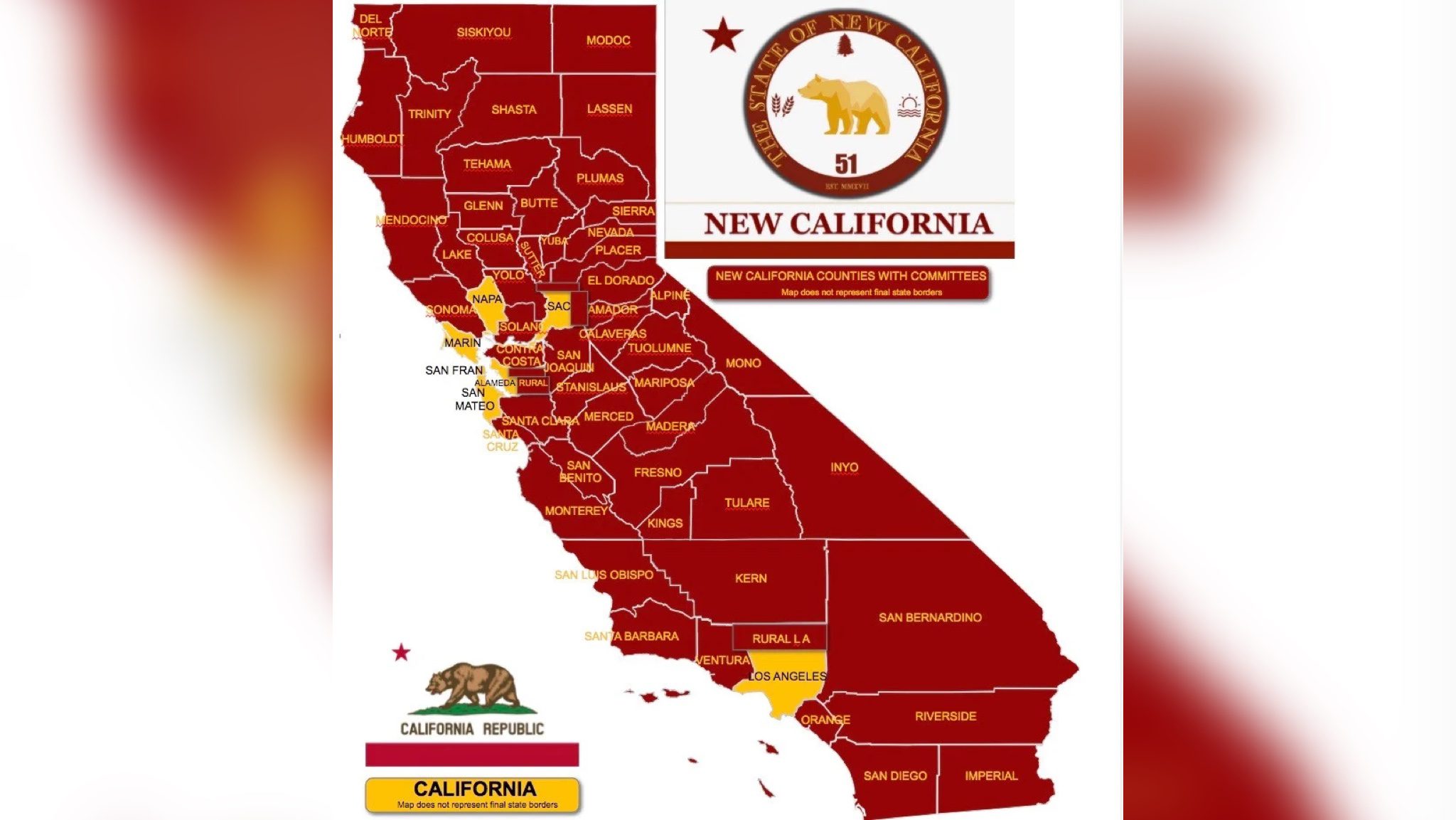You are using an out of date browser. It may not display this or other websites correctly.
You should upgrade or use an alternative browser.
You should upgrade or use an alternative browser.
Ever Wonder Why California is so Broke?
- Thread starter festeringZit
- Start date
First of all, like most Cult 45ers, you post lies a lot, for example, about the "exodus:"Since you are clearly the dumbest fuck in here, and the biggest scumbag, I probably shouldn't waste my time responding. But, here are
some facts for you to chew on you fucking slimy maggot:
California has the nation's third-highest cost of living index at 142.2. California's transportation costs are the second-highest in the country, due in part to high gas prices in the State. Housing in California is twice the national average, with a typical single-family home priced at $683,996. The average rent for a two-bedroom apartment in California is $1,614. Costs run much higher in major metropolitan areas, such as Los Angeles and San Francisco.
The living wage for a family of four in California is $110,255, while the median family income is $105,232. California also has the highest rate of homelessness in the nation.
Which is why people are running away from the fruitcake state in droves:
https://en.wikipedia.org/wiki/California_exodus
The California exodus is a mass emigration of residents and businesses from California to other U.S. states, especially Texas and Florida. The cause and existence of this migration occurred because of the policies enacted by the government of California. The term became popular during the COVID-19 pandemic
According to the California Department of Finance, the state had 135,600 more people move out than moved in from July 1, 2019, to July 1, 2020, marking the third straight year of net migration losses.[5] After peaking just shy of 40 million Californians,[6] by 2020 into 2022 onward this slowing had crossed the ZPG mark into outright negative population growth for the first time in over a century.[7]
The state has had a net loss of domestic migrants every year since about 1989,[8] and in the period from 2015 to 2019 it had a net loss of at least 100,000 domestic migrants per year due to more Californians moving to other states than vice versa.[4] According to Census Bureau estimates, 6,185,000 people left the state in the 2010s decade, while 4,934,000 moved in—for a net loss of 1,251,000 residents.[9]
The change is visible in state-to-state migration flows. In 1955–1960, the ten largest state-to-state migration flows involving California all had the state as a recipient of people. This is contrasted with the period 1995–2000, where nine of the ten largest flows involving the state had California as a net loser, with only New York sending more people to California than it received in return.[10]
In 2021, more than 360,000 people left California, especially going to states like Texas, Arizona and Washington. Some are even moving to Mexico to avoid the 2021–2022 inflation surge, as Mexico is more affordable to live in than the United States.[11]
Several businesses, particularly Silicon Valley companies, have moved their headquarters out of California in recent years. Though they have moved to a variety of other states, Texas has received many of the new headquarters, including those of Hewlett Packard Enterprise and Oracle. Businessman Elon Musk moved from California to Texas in late 2020, though his companies SpaceX and Tesla remained in California.[8] Tesla has since relocated to Austin, Texas.
California has repeatedly been ranked as one of the country’s most expensive states to live in. The median asking price for a house is $797,470 in California, which only a quarter of households in the state can afford.[11]
Economists have cited restrictive zoning policies and lack of investment in transportation infrastructure that has resulted in sprawl, constrained housing supply, high housing prices, and severe congestion. They also cited over-reliance on sales tax, fees, and disproportionate property taxes on new residents caused by 1978 California Proposition 13.[12]
Various reasons for the exodus include, but are not limited to, state and environmental regulations, high taxes and social policies as causes. Some sources cite progressives as the root cause for the problems that California is facing, including increased homelessness, increased drug use among homeless people, the uncleanness of California's streets, strict COVID-19 lockdowns and COVID-19 vaccine mandates that harm small and medium-sized businesses.[13][14]
Stay out of my threads you retarded fucking maggot, unless you want me to keep ripping you a new asshole every single time.
Don't you have some old ladies you need to try and scam?
Fucking vile piece of shit.

The much-discussed ‘California exodus’ isn’t real, study finds
Claims that fed-up residents are leaving en masse have been widespread – but they’re a myth, researchers say

Column: The California exodus is a myth. But that doesn't stop the haters
Reports of the state's decline and fall are a cyclical staple. Blame it on envy and partisanship
Secondly, it is well known that it's expensive to live there, but, what does the price of housing have to do with STATE being broke, you brain dead, always wrong nitwit? The state's GNP speaks for itself, and left YOU looking like a moron as usual.
Oh, btw, how's your Fuhrer doing these days? His louse-ridden fellow grifter, just did the perp walk, for doing the EXACT same thing DT, and now they just started looking into his grifter PAC money. SUCKS to be you, doesn't it, Festering Sack?
Are you kidding me?


California Bans Sale of Natural Gas Heaters by 2030
September 23, 2022, 7:50pmby Cristina Laila @KevinForBOS / Twitter screenshot
@KevinForBOS / Twitter screenshotNewsom’s 10-Year Plan to End Homelessness Sounds Great – But This Video Is from 2008
September 24, 2022, 2:12pmby Richard Moorhead, The Western Journal@KevinForBOS / Twitter screenshot
Newsom’s 10-Year Plan to End Homelessness Sounds Great – But This Video Is from 2008
September 24, 2022, 2:12pmby Richard Moorhead, The Western Journal
Liberalism fails every single time.
Really good interview.

 www.brighteon.com
www.brighteon.com

New California movement founder Paul Preston joins Mike Adams to discuss the golden future of a free California
Brighteon.com is a leading online free platform that empowers free speech, allowing individuals to freely share videos and express their thoughts without any form of censorship. Join us today and be part of our community.

Elderly Wheelchair-Bound Man Stabbed In Neck And Shoulder While Eating In Taco Bell, Suspect Still On The Loose
October 14, 2022, 5:30pmby Alicia Powe
The State of New California Takes One Step Closer to Being America’s 51st State
October 23, 2022, 8:00pmby Joe HoftI overlooked this article from earlier this month. Nice call, Dipshit. Are you EVER right about ANYTHING?





Despite all the critics, California could soon rise to the world's 4th-largest economy
Forecasts show California could soon surpass Germany in GDP, a measure that reflects the state's growth and resiliency, but also Germany's economic struggles.
Despite all the critics, California could soon rise to the world's 4th-largest economy
Grace Toohey
November 2, 2022
A few high-profile business titans have loudly departed, most notably Tesla and SpaceX Chief Executive Elon Musk, who moved Tesla's headquarters — and himself — to Texas during the pandemic (though SpaceX remains headquartered in Southern California).
Nonetheless, there are mounting predictions from some economists that the Golden State could soon surpass Germany to become the world's fourth-largest economy.
Moving from the world's fifth- to fourth-largest economy would be another step up for California — which would trail only the U.S., China and Japan. But some economic experts say the expected bump may have more to do with Germany's struggling economy and the falling value of the euro than California's growth.
"The U.S. as a whole over the past decade grew a bit faster than Germany, and California grew faster than the U.S., on average," said David Zeke, a USC assistant professor of economics. "So you have that growth trend there. But the reason why it might happen next year is because of this 15% depreciation" of the euro.
California would probably topple Germany because of its "relatively resilient" economy, even during the pandemic and amid high inflation, according to a recent Bloomberg opinion piece. The piece analyzed California's and Germany's past and projected gross domestic product, which in 2021 measured $3.4 trillion and $4.2 trillion, respectively. The Bloomberg analysis forecast that this year and into next, California's GDP would continue to grow slightly, while Germany's would shrink, allowing California to take the lead.
Eugene Cornelius, senior director at the Center for Regional Economics at the Santa Monica-based Milken Institute, said he found Bloomberg's prediction on target and expects California to surpass Germany in economic size soon, if it hasn't already.
"I think this was the best kept secret," Cornelius said. "Everybody was focusing on the California exoduses, the wildfires, the earthquakes and everything that was negative going on, but I don't think anybody was paying attention to the growth."
Although Gov. Gavin Newsom quickly touted the prediction as a sign of California's prosperity, some experts note the metric is just one measure of California's economy. It fails to take into consideration important factors such as housing affordability, income inequality, cost of living and wealth distribution, all key areas in which California has continued to struggle, making it difficult for middle- and low-income families to thrive in many parts of the state, according to economic experts.
"California GDP being pretty big doesn't mean that your median [person] in California is necessarily better off," Zeke said. "It just means the aggregate economy is more important, is larger, compared to other large economies."
So, what is GDP?
GDP stands for gross domestic product and is an economic data point that is "widely used as a reference point for the health of national and global economies," according to the International Monetary Fund."It counts all of the output generated" in a certain geopolitical region, such as a country or state, according to the IMF.
GDP measures the monetary value of all final goods and services produced in one jurisdiction during a specific period, often quarterly or yearly. GDP can be measured by taking into account inflation, called "real GDP," or population, called "GDP per capita," but most basically is measured in nominal GDP — simply the value of a region's outputs at current prices. This is the measurement used in world rankings in which California is compared with other countries.
"This is just a statement about the aggregate scale of the California economy," Zeke said, noting the nominal GDP doesn't look at inequality or wages. "That's not a statement about the welfare of the average Californian, ... that's a completely different measure."
Why is California in a position to surpass Germany?
California businesses in the last year have outpaced German companies, especially in three of the state's top industries: technology hardware, media and software, according to Bloomberg editor in chief emeritus Matthew Winkler. But he also noted the state's strides in renewable energy — a sector that Winkler said has been the "fastest-growing" in recent years for both California and Germany."The margin of Germany's nominal GDP of $4.22 trillion over California's $3.357 trillion last year was the smallest on record and is about to disappear," Winkler wrote in the piece.
Other economic analysts pointed to California's low unemployment rate, strong entrepreneurial spirit, sustained tourism and development, as well as government spending that has helped mitigate potential economic stressors.
"California has a really innovative economy," said Irena Asmundson, a research scholar at the Stanford Institute for Economic Policy Research. "We have strengths and a lot of different sectors, it's not just technology. ... And we continually try to invent the things that are going to make a difference in the future."
She pointed out that California is home to the nation's largest manufacturing hub as well as a huge agricultural sector, though it accounts for only a fraction of the state's overall GDP — all points she said makes California's advance in rankings "a very real possibility."
She noted that when California's economy surpassed the U.K.'s in 2017, it required a strong and resilient California, but challenges in Britain played a more prominent role.
"The U.K. was a very similar situation, and the exchange rate moved a lot after Brexit," Asmundson said, referring to Britain's exit from the European Union in 2020. "It's not as though this is all California innovation, it's also partially those external factors."
Although Winkler mentions in his analysis that "Germany, of course, has been severely impacted by the war in Ukraine," many experts say that aspect of the equation was heavily downplayed in the probability that California will surpass Germany.
"It is true that California's GDP has grown slightly faster annually than Germany's over the past decade," Zeke said. "But what's really dramatic recently is the deterioration of the euro versus the dollar."
When could California move to No. 4?
Winkler said that some of Bloomberg's "estimates suggest the state may have already caught Germany, with at least one forecast implying California is ahead by $72 billion when considering the state's recent growth rate."Figures on GDP won't be published until spring next year to confirm any projections, but most of the experts who spoke with The Times agreed it was likely to occur, if not this year, by the end of 2023.
"It's likely to occur now because Germany is going to be growing a lot slower, it appears, than California will over the next year or two," said Mark Schniepp, director of the California Economic Forecast, an economic consulting firm.
But leaders at the California Business Roundtable, a nonprofit that often criticizes the regulations imposed on state businesses, were not convinced the Golden State would usurp Germany in the rankings. In the group's "fact check" of Bloomberg's data, its analysts showed more conservative projections for 2023, in which the gap between California and Germany would further shrink but not flip.
What does being the fourth-largest economy mean for California?
Robert Lapsley, president of the California Business Roundtable, said a higher ranking for California is an indicator of "the health of the state as a whole," though he doubted it would become a factor in most businesses' decisions about moving or growing in California."It is an important point to be able to understand where our economy fits in from a global perspective, and to be able to try to understand what are the strengths of our different sectors, and then how can we continue to help them grow," Lapsley said.
Cornelius, with the Milken Institute, said it may not factor directly into a company's decisions, but it could slowly change how industries move forward.
"I think it means that we will have access to even more talent," Cornelius said. "This will make California more marketable."
As for continuing to drive manufacturing or green standards, Zeke said moving up in world rankings increases California's power to do so.
"The bigger California is, ... the more likely companies will try to create a product that meets the California requirements," Zeke said. "I think for being a center of trade, for being a place that attracts business, being big can be helpful."
Schniepp said a new ranking for California most basically "puts things in perspective" about the size of California's economy. In his mind, it's "just a ranking," he said, calling GDP "an elusive, ethereal" concept that isn't relevant to the average Californian.
What is missing in GDP rankings?
The GDP ranking doesn't take into consideration issues such as cost of living, high taxes, poverty and unemployment, which some experts say are still big problems for California.Looking just at nominal GDP ignores the very real concerns that average Californians and business owners face, Lapsley said. “We would like to catch Germany, we are ideally making progress on Germany, but the bottom line is that we have some major issues,” he said.
The California Business Roundtable did a separate analysis, taking into consideration parity in pricing — or cost of living — which showed California well behind Germany, at No. 11 on the world stage.
Zeke agreed that such a massive data point as GDP doesn't take into consideration factors such as poverty, unemployment, inequality and population changes — which are also important to consider.
This story originally appeared in Los Angeles Times.








